As chemistry isomerism - Study guides, Revision notes & Summaries
Looking for the best study guides, study notes and summaries about As chemistry isomerism? On this page you'll find 127 study documents about As chemistry isomerism.
Page 2 out of 127 results
Sort by
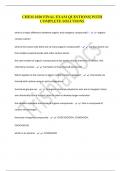
-
CHEM 1020 FINAL EXAM QUESTIONS| WITH COMPLETE SOLUTIONS
- Exam (elaborations) • 17 pages • 2024
-
- £8.12
- + learn more
CHEM 1020 FINAL EXAM QUESTIONS| WITH COMPLETE SOLUTIONS what is a major difference between organic and inorganic compounds? - -organic contain carbon what is the reason why there are so many organic compounds? - -carbon atoms can form stable covalent bonds with other carbon atoms the vast number of organic compounds is due to the unique chemistry of carbon. this chemistry involves - -formation of long chains& isomerism Which applies to the manner in which carbon bonds in alkanes? - -the ...

-
THE Test Bank for Chemistry 6th Edition Gilbert
- Exam (elaborations) • 140 pages • 2024
-
- £10.96
- + learn more
W. W. Norton & Company has been independent since its founding in 1923, when William Warder Norton and Mary D. Herter Norton first published lectures delivered at the People’s Institute, the adult education division of New York City’s Cooper Union. The firm soon expanded its program beyond the Institute, publishing books by celebrated academics from America and abroad. By midcentury, the two major pillars of Norton’s publishing program—trade books and college texts—were firmly estab...
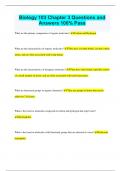
-
Biology 103 Chapter 3 Questions and Answers 100% Pass
- Exam (elaborations) • 8 pages • 2024
- Available in package deal
-
- £8.12
- + learn more
Biology 103 Chapter 3 Questions and Answers 100% Pass What are the primary components of organic molecules? Carbon and Hydrogen What are the characteristics of organic molecules? They have covalent bonds, can have many atoms, and are often associated with living things. What are the characteristics of inorganic molecules? They have ionic bonds, typically consist of a small number of atoms, and are often associated with nonliving matter. What are functional groups in organic chem...
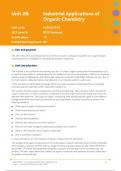
-
Industrial Applications of Organic Chemistry
- Exam (elaborations) • 14 pages • 2024
-
- £7.31
- + learn more
Unit 28: Industrial Applications of Organic Chemistry Unit code: H/502/5573 QCF Level 3: BTEC National Credit value: 10 Guided learning hours: 60 Aim and purpose The aim of this unit is to familiarise learners with the structure, naming and properties of a range of organic compounds and to investigate the industrial uses of these compounds. Unit introduction The majority of the substances we use every day are, or contain, organic compounds. Pharmaceuticals such as aspirin and parac...
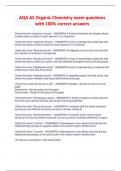
-
AQA AS Organic Chemistry exam questions with 100% correct answers
- Exam (elaborations) • 17 pages • 2024
- Available in package deal
-
- £11.37
- + learn more
AQA AS Organic Chemistry exam questions with 100% correct answers Define the term 'empirical formula' - ANSWERS A formula that gives the simplist whole number ration of atoms of each element in a compound Define the term 'molecular formula' - ANSWERS A way of representing molecules that shows the actual number of atoms of each element in a molecule Define the term 'General formula' - ANSWERS An algebraic formula that can describe any member of a family of compounds Define the t...
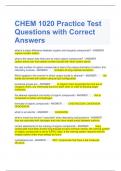
-
CHEM 1020 Practice Test Questions with Correct Answers
- Exam (elaborations) • 12 pages • 2024
- Available in package deal
-
- £10.56
- + learn more
CHEM 1020 Practice Test Questions with Correct Answers what is a major difference between organic and inorganic compounds? - ANSWER organic contain carbon what is the reason why there are so many organic compounds? - ANSWER carbon atoms can form stable covalent bonds with other carbon atoms the vast number of organic compounds is due to the unique chemistry of carbon. this chemistry involves - ANSWER formation of long chains& isomerism Which applies to the manner in which carbon bonds...
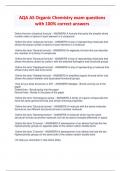
-
AQA AS Organic Chemistry exam questions with 100% correct answers
- Exam (elaborations) • 17 pages • 2024
- Available in package deal
-
- £11.78
- + learn more
AQA AS Organic Chemistry exam questions with 100% correct answers Define the term 'empirical formula' - ANSWERS A formula that gives the simplist whole number ration of atoms of each element in a compound Define the term 'molecular formula' - ANSWERS A way of representing molecules that shows the actual number of atoms of each element in a molecule Define the term 'General formula' - ANSWERS An algebraic formula that can describe any member of a family of compounds Define the t...
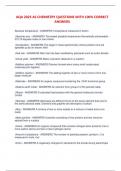
-
AQA 2023 AS CHEMISTRY QUESTIONS WITH 100% CORRECT ANSWERS
- Exam (elaborations) • 12 pages • 2024
- Available in package deal
-
- £11.37
- + learn more
AQA 2023 AS CHEMISTRY QUESTIONS WITH 100% CORRECT ANSWERS Absolute temperature - ANSWERS Temperature measured in Kelvin Absolute zero - ANSWERS The lowest possible temperature theoretically achieveable - 273.15 degrees celius or zero Kelvin Acceleration - ANSWERS The stage in mass spectrometry where positive ions are speeded up by an electric field Acid rain - ANSWERS Rain that has been acidified by pollutants such as sulfur dioxide Actual yield - ANSWERS Mass of product obtained in a ...
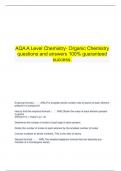
-
AQA A Level Chemistry- Organic Chemistry questions and answers 100% guaranteed success.
- Exam (elaborations) • 14 pages • 2024
-
- £10.96
- + learn more
AQA A Level Chemistry- Organic Chemistry questions and answers 100% guaranteed success. Empirical formula - ANS.The simplest whole number ratio of atoms of each element present in a compound How to find the empirical formula - ANS.Obtain the mass of each element present in grams (Element % = mass in g = m) Determine the number of moles of each type of atom present Divide the number of moles of each element by the smallest number of moles Co...

Study stress? For sellers on Stuvia, these are actually golden times. KA-CHING! Earn from your revision notes too and start uploading now. Discover all about earning on Stuvia

![AQA A-level CHEMISTRY 7405/1 Paper 1 Inorganic and Physical Chemistry Version: 1.0 Final *JUN237405101* IB/M/Jun23/E9 7405/1QUESTION PAPER & MARKING SCHEME/ [MERGED] Marl( scheme June 2023](/docpics/4426917/65c0f4fd8496f_4426917_121_171.jpeg)

